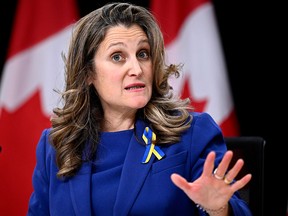Economic indicators paint a stark contrast to the Liberal government's rosy assessment

Article content
Canada remains a chronic underachiever. Our economy contracted by 1.06 per cent quarter-over-quarter in the third quarter, while the United States economy grew by 5.2 per cent. The European Union and Australia also saw modest economic growth.
We may not technically be in a recession yet, but the picture isn’t looking good, according to Bank of Montreal economist Doug Porter.
Advertisement 2
Article content
Article content
“Whatever label you slap on this economy, it’s basically not growing, despite the artificial sweetener of rapid population growth,” he told CBC News. “The big picture is that the Canadian economy is struggling to grow, yet managing to just keep its head above recession waters.”
The question is: how does a country with so much potential and a massive resource endowment end up lagging behind its peers? The answer is simple: Canada’s federal government is run by economic neophytes.
On Nov. 21, Finance Minister Chrystia Freeland boasted that, “Canada is now a global investment destination of choice … and the IMF projects Canada to likewise see the strongest economic growth in the G7 next year.”
But the most recent IMF projection is that U.S. GDP will increase by 2.1 per cent in 2023, but Canada’s will only grow by 1.3 per cent.
As for being the “investment destination of choice,” the figures show otherwise. Net foreign direct investment (FDI) plummeted throughout much of the Liberals’ first term. According to figures from the World Population Review, last year, the U.S. led the world, with net FDI inflows of $388 billion, followed by China ($180 billion), Singapore ($141 billion), Hong Kong ($121 billion), France ($105 billion), Brazil ($92 billion), Australia ($67 billion) and Canada ($54 billion).
Article content
Advertisement 3
Article content
Canada’s economic prospects are not so rosy, either. In its summary of an IMF report released over the summer, the Fraser Institute noted: “Expanding the population and workforce does increase the size of the economy, but the IMF observes that it’s ‘not a recipe for growing per capita income or living standards.’ And the data show that this is where Canada has been failing short; prosperity on a per-person basis has been stagnant since the mid-2010s.…
“As for Canada’s investment climate, the IMF suggests it has deteriorated relative to comparator jurisdictions. As evidence, the report cites the fact that gross fixed capital formation (a broad measure of investment) puts Canada in the bottom quartile among the 38 countries that are members of the OECD.…
“To explain sluggish Canadian investment, the IMF highlights insufficient product market competition, restrictions on foreign direct investment and government-fostered policy uncertainty that’s hindering new investment in the mining and energy sectors in particular.…
“Since 2017, Canada has lost almost all the business tax advantages it previously enjoyed vis-à-vis the United States, a development that undeniably has made the country a less attractive place to deploy capital than it was a decade ago.”
Advertisement 4
Article content
Worse, Canadian debts are too high, making businesses, governments and consumers vulnerable to higher interest rates. The IMF provides two metrics that explain the problem.
In 2022, Canada’s “Household debt, loans and debt securities” as a proportion of the country’s GDP was the highest in the G7. Canada’s indebtedness was equivalent to 102 per cent of its GDP; the United Kingdom was 83 cent; the U.S. was 74 per cent; Germany was 55 per cent; Italy 42 per cent; France 66 per cent; and Japan was 68 per cent.
Related Stories
The second metric is Canada’s excessive price-to-income ratio, or the median price paid for property compared to average disposable income. In the middle of this year, Canada’s ratio was 9.6, more than double the U.S. ratio of 4.2.
On top of this, excessive government deficits (federal and provincial) hobble Canada’s economy with debt and interest payments. This was foreseen in 2021 when the OECD predicted that Canada will be the worst performing economy for the next decade, and for three decades after that.
Numbers matter.
Article content
Diane Francis: Canada in deep economic trouble - Financial Post
Read More



Comments